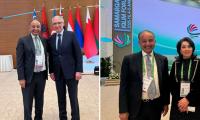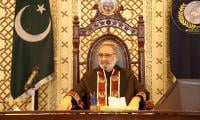Mahathir Mohamad, the newly-elected prime minister of Malaysia, was quoted as saying that: “China comes with a lot of money and says you can borrow this money. But you must think, ‘how do I repay?’ Some countries see only the project and not the payment part of it. That’s how they lose chunks of their country. We do not want that”.
CPEC has been the topic of discussion for almost every rational Pakistani for many years. Paradoxically, it has been indoctrinated in our minds that this project will serve as a game-changer for Pakistan as it brings development projects. These include infrastructure-related projects and energy initiatives.
Different infrastructural projects have been completed while many others are still in progress. Special economic zones are being constructed across the country, including Khyber Pakhtunkhwa. These different projects are to be completed before 2025.
Special economic zones are among the main projects. Subsequently, the whole CPEC route has been declared a free economic zone. This means that China’s economy as well as Pakistan’s economy will have access to each other’s markets without any tariff or non-tariff barriers.
Given our inefficient domestic industries and the negative net benefit of our free trade agreement with China, we might conclude that Pakistan’s industries will never compete with Chinese industries if they don’t have special protection under free economic zones. As a result, our domestic industries may become deactivated.
This compels us to question whether CPEC can bring prosperity to Pakistan. Can we reap the benefits of this initiative? Do we have the potential to pay back what has been invested into this initiative? In this context, the words of Dr Asfaque Hassan Khan, an illustrious economist, instantly come to mind: “Debt in itself in not a bad thing, it is the burden of the debt which have serious repercussions on any economy”.
If you do not have the ability to utilise your debt productively, the principal amount and the interest payment (amortisation payment) will cause problems and may result in a leakage from the economy. Pakistan, in its recent fiscal budget, allocated Rs1,620 billion for amortisation payments. This is because the accumulated external debt has reached an alarming rate.
The authorities concerned would have had to ponder over the matter before signing the agreement to ensure that we don’t face a similar situation to the one which the Sri Lankan government has recently encountered with regard to the Hambantota Port.
In 2010, Mahinda Rajapaksa, the then president of Sri Lanka, signed an agreement with China to build a sea port in the Indian Ocean in order to harbour Hambantota – the hometown of Rajapaksa – after it was crushed by a tsunami in 2004. The proposal of the Hambantota Port was first presented to the Indian government. But they refused to invest in the project on the grounds of economic viability. When the same offer was made to China, it invested about $1.5 billion in 2010 to build the port.
Because the port remained empty for months after it was completed – and also due to the lack of economic viability of the port – the Sri Lankan government finds it difficult to make the project profitable. It has struggling to generate enough money for the amortisation payment of the loan taken from China. Therefore, Sri Lanka has been left with no other option but to lease the same port for 99 years to China.
Geopolitical analysts consider China’s decision to invest in the port a strategic investment. It has been done with a view to gain access to the Indian Ocean. The analyst further argued that Chinese investment in different countries under the One Belt One Road (OBOR) initiative may face similar straits.
CPEC has been launched with investment worth $62 billion, which is almost 20 percent of our current GDP. In addition to the economic factors, this gigantic project may have similar strategic repercussions as those that were witnessed in Sri Lanka and we may lose chunks of our land that we cannot afford. The upcoming government needs to reconsider this matter and restructure policies before it is too late.
The writer heads the department of economics at the University of Swabi.
Email: arsalan@uoswabi.edu.pk
Pakistan can't afford another status quo budget so it must be budget of imagination, risk-taking and system-level...
Driven by flawed logic, his administration has imposed tariffs designed to artificially rebalance trade
But then, it is not that human beings would succumb to these pressures easily, no matter how enormous
Our failure to do so carries the risk of undermining unity and stability of country
According to Chanakya, secret of strong nation lies in ability to protect its citizens
Rapid economic progress was made possible under Modi's leadership if not ‘Modi's guarantee’







